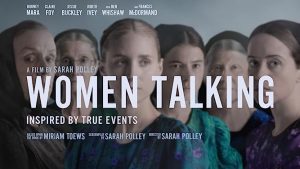WHILE I dislike when film critics say ‘I wanted to like it, but…’, I understand what they mean.
Sarah Polley’s 2022 drama Women Talking had been drenched in praise by the time I caught up with it, so expectations were high.
Generally it delivered, but there were aspects mainly to do with the script that weighed the viewing down and caused unnecessary distraction from what should be a high-charged and emotional experience.
If you have seen the drama Mass, which is basically four people talking to each other in one room for two hours, you will understand what this kind of film can deliver.
Polley’s film, which she also wrote, is based on a 2018 Canadian novel by Miriam Toews which was in turn inspired by actual events that occurred in Bolivia during 2005.
Women and girls living in a remote Mennonite community were waking up to find they had been sexually assaulted. The dominant male community insisted they were being visited during the night and defiled by demons and ghosts.
Many of the females were not educated and initially believed the tales, but eventually they joined together to expose the men who had been drugging and raping them.
Women Talking shifts the location to mid-western America and focusses on the pivotal discussion between a leading group of the women as to what they should do – confront the men and try to change their community or leave their husbands and many of their families and start a new, safe community together.
The ensemble cast includes some of the best actresses working in film today, including Rooney Mara, Claire Foy, Jessie Buckley and the great Frances McDormand who, unfortunately, only has a few scenes.
In obviously timely circumstances today, the women discuss the nature of the male/female dynamic, feelings of guilt brought upon themselves and the fundamental questions of what it means to be of either sex and whether change can truly occur.
The discussions are fascinating and thought-provoking and Polley uses every trick she can to open up the interior location so viewers can remain focused on the drama without becoming bored.
The change in location is problematic. The actual events occurred in a highly isolated community in a country where education is undoubtedly difficult to attain generally.
Some of the dialogue and debate in Women Talking is also delivered almost too eloquently and on point by people who are meant to be so uneducated and superstitious that they have believed the stories presented by their attackers over a prolonged period.
Maybe this is nit-picking and the actual events are just hard to comprehend by people like myself who have grown up and exist in completely different circumstances.
Women Talking is flawed, but it’s also a film and story that needs to keep on being told.
Women Talking ★★★
WHILE I dislike when film critics say ‘I wanted to like it, but…’ I understand what they mean.
Sarah Polley’s 2022 drama Women Talking had been drenched in praise by the time I caught up with it, so expectations were high.
Generally it delivered, but there were aspects mainly to do with the script that weighed the viewing down and caused unnecessary distraction from what should be a high-charged and emotional experience.
If you have seen the drama Mass, which is basically four people talking to each other in one room for two hours, you will understand what this kind of film can deliver.
Polley’s film, which she also wrote, is based on a 2018 Canadian novel by Miriam Toews which was in turn inspired by actual events that occurred in Bolivia during 2005.
Women and girls living in a remote Mennonite community were waking up to find they had been sexually assaulted. The dominant male community insisted they were being visited during the night and defiled by demons and ghosts.
Many of the females were not educated and initially believed the tales, but eventually they joined together to expose the men who had been drugging and raping them.
Women Talking shifts the location to mid-western America and focusses on the pivotal discussion between a leading group of the women as to what they should do – confront the men and try to change their community or leave their husbands and many of their families and start a new, safe community together.
The ensemble cast includes some of the best actresses working in film today, including Rooney Mara, Claire Foy, Jessie Buckley and the great Frances McDormand who, unfortunately, only has a few scenes.
In obviously timely circumstances today, the women discuss the nature of the male/female dynamic, feelings of guilt brought upon themselves and the fundamental questions of what it means to be of either sex and whether change can truly occur.
The discussions are fascinating and thought-provoking and Polley uses every trick she can to open up the interior location so viewers can remain focused on the drama without becoming bored.
The change in location is problematic. The actual events occurred in a highly isolated community in a country where education is undoubtedly difficult to attain generally.
Some of the dialogue and debate in Women Talking is also delivered almost too eloquently and on point by people who are meant to be so uneducated and superstitious that they have believed the stories presented by their attackers over a prolonged period.
Maybe this is nit-picking and the actual events are just hard to comprehend by people like myself who have grown up and exist in completely different circumstances.
Women Talking is flawed, but it’s also a film and story that needs to keep on being told.
